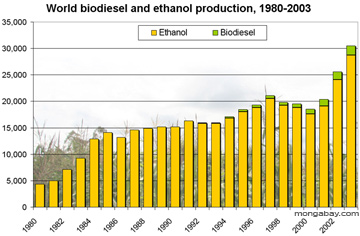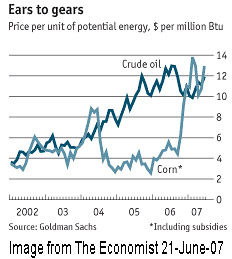Guidelines to ensure biofuels production won’t hurt the environment
Guidelines to ensure biofuels production won’t hurt the environment
mongabay.com
August 30, 2007
|
|
Environmentalists have long seen biofuels as a means to improve the sustainability of transportation and energy use since they are a renewable source of energy that can be replenished on an ongoing basis. Further, because biofuels are generally derived from plants, which absorb carbon from the atmosphere as they grow, biofuel production offers the potential to help offset carbon dioxide emissions and mitigate climate change. Nonetheless, in recent years, there has been considerable backlash against biofuels, which are increasingly viewed as a threat to the environment. Green groups now point to large-scale land conversion for energy crops, higher food prices, and a spate of studies that suggest net emissions from corn ethanol are little better than those from fossil fuels, to caution that biofuels can cause more problems than they address.
 World biodiesel and ethanol production, 1980-2003, based on data from the International Energy Agency (IEA). Graphic by Rhett A. Butler |
To address these concerns, the Energy Center of the EPFL (Swiss Federal Institute of Technology, Lausanne) has launched the Roundtable on Sustainable Biofuels, a multi-stakeholder initiative, which aims to establish social and environmental sustainability standards. By mid 2008, the group hopes to develop draft standards in conjunction with non-governmental organizations, companies, governments and inter-governmental groups from all over the world. The roundtable seeks to “create a tool that consumers, policy-makers, companies, banks, and other actors can use to ensure that biofuels deliver on their promise of sustainability.”
“Many people are worried about biofuels contributing to deforestation and air pollution in the name of protecting the planet,” said Claude Martin, former Director-General of WWF International and Chair of the Roundtable’s Steering Board. “Companies and farmers want global rules that they can follow. The Roundtable will bring together all of these actors to start writing these rules together, to ensure that biofuels deliver on their promise of sustainability.”
 Price per unit of potential energy, dollars per million Btu. Corn price includes subsidies. |
After a thorough interactive consultation of its members, the working group on environment is currently working on a new set of draft principles:
- Biofuel production should not directly or indirectly endanger wildlife species or areas of high conservation value.
- Biofuel production should not directly or indirectly degrade or damage soils.
- Biofuel production should not directly or indirectly contaminate or deplete water resources.
- Biofuel production should not directly or indirectly lead to air pollution.
- The use of biotechnologies for biofuels production should improve their social and/or environmental performance, and always be consistent with national or international biosafety protocols.
These principles can be consulted and commented at http://www.bioenergywiki.net/index.php/Draft_Principles
“Our hope is that in an academic setting, companies, governments, and civil organizations will be able to come to consensus on how to ensure biofuels are produced sustainably,” said Dr. Patrick Aebischer, President of the EPFL.
For more information and registration to the working groups, please visit the official RSB webpage.
Related articles
Biofuels driving destruction of Cerrado savanna in Brazil
(08/21/2007) The cerrado, wooded grassland in Brazil that once covered an area half the size of Europe, is fast being transformed into croplands to meet rising demand for soybeans, sugarcane, and cattle. The cerrado is now disappearing more than twice as the rate as the neighboring Amazon rainforest, according to a Brazilian expert on the savanna ecosystem.
Palm oil doesn’t have to be bad for the environment
(4/4/2007) As traditionally practiced in southeast Asia, oil palm cultivation is responsible for widespread deforestation that reduces biodiversity, degrades important ecological services, worsens climate change, and traps workers in inequitable conditions sometimes analogous to slavery. This doesn’t have to be the case. Following examples set forth by the Roundtable on Sustainable Palm Oil and firms like Golden Hope Plantations Berhad, a Malaysian palm oil producer, oil palm can be cultivated in a manner that helps mitigate climate change, preserves biodiversity, and brings economic opportunities to desperately poor rural populations.
Eco-friendly palm oil could help alleviate poverty in Indonesia
(4/3/2007) The Associated Press (AP) recently quoted Marcel Silvius, a climate expert at Wetlands International in the Netherlands, as saying palm oil is a failure as a biofuel. This would be a misleading statement and one that doesn’t help efforts to devise a workable solution to the multiplicity of issues surrounding the use of palm oil.
Could peatlands conservation be more profitable than palm oil?
(8/22/2007) This past June, World Bank published a report warning that climate change presents serious risks to Indonesia, including the possibility of losing 2,000 islands as sea levels rise. While this scenario is dire, proposed mechanisms for addressing climate change, notably carbon credits through avoided deforestation, offer a unique opportunity for Indonesia to strengthen its economy while demonstrating worldwide innovative political and environmental leadership. In a July 29th editorial we argued that in some cases, preserving ecosystems for carbon credits could be more valuable than conversion for oil palm plantations, providing higher tax revenue for the Indonesian treasury while at the same time offering attractive economic returns for investors.
Why is palm oil replacing tropical rainforests?
(4/25/2006) In a word, economics, though deeper analysis of a proposal in Indonesia suggests that oil palm development might be a cover for something more lucrative: logging. Recently much has been made about the conversion of Asia’s biodiverse rainforests for oil-palm cultivation. Environmental organizations have warned that by eating foods that use palm oil as an ingredient, Western consumers are directly fueling the destruction of orangutan habitat and sensitive ecosystems. So, why is it that oil-palm plantations now cover millions of hectares across Malaysia, Indonesia, and Thailand? Why has oil palm become the world’s number one fruit crop, trouncing its nearest competitor, the humble banana? The answer lies in the crop’s unparalleled productivity. Simply put, oil palm is the most productive oil seed in the world. A single hectare of oil palm may yield 5,000 kilograms of crude oil, or nearly 6,000 liters of crude.